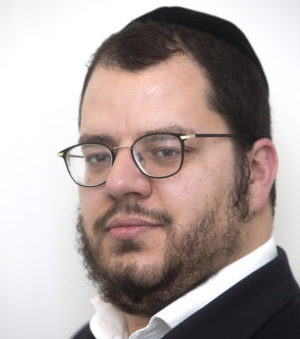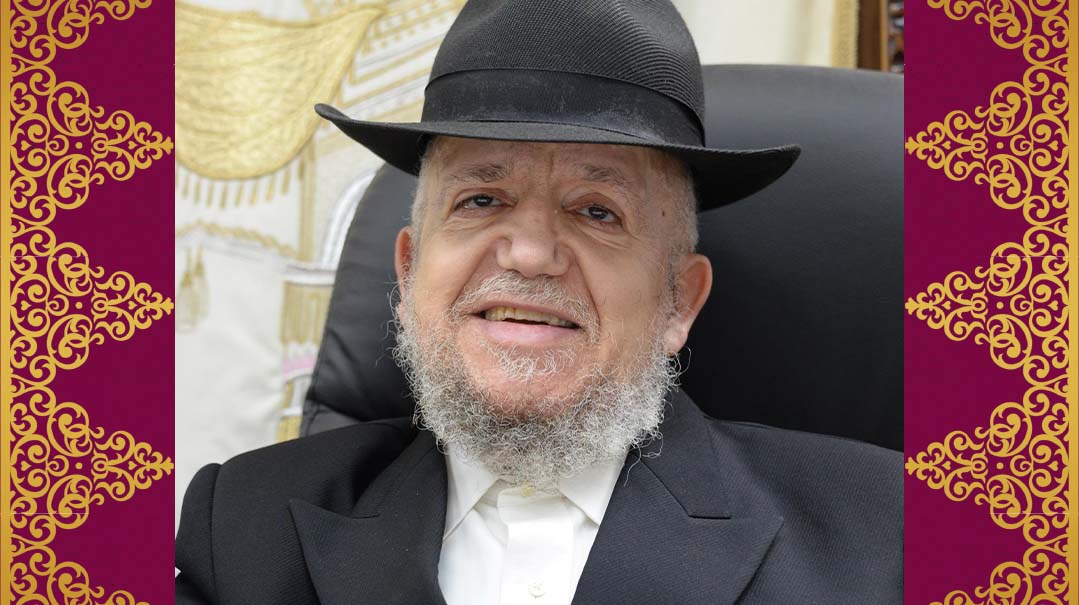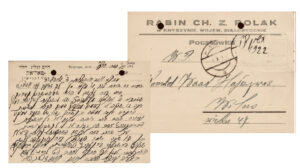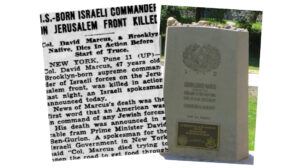Beating the Gun

47 years haven’t dulled the ache of that horrific morning or the difficult period that ensued

(Photos: Ezra Trabelsi, Yaakov Cohen, Family archives)
I
t’s already been 48 years, but for Tunisian kehillah leader and rosh yeshivah, Rav Meir Mazuz, and his brothers, the shots that gunned down their holy father on a Tunis street still pierce their own hearts.
It was a Monday morning, 21 Teves 5731/January 18, 1971, and Rav Matzliach Mazuz, who at age 59 was the last of the Tusinian geonim, was walking home from an early Shacharis, accompanied by a young lad. It was a local holiday and most of the shops were closed, but the fishmonger was open, and Rav Matzliach made his way there to buy fish for Shabbos. True, it was only Monday, but for Rav Matzliach, it was never too early to prepare for Shabbos. Times, though, were turbulent for the dwindling Jewish community, which had plummeted from about 100,000 to 15,000 since the founding of the State of Israel in 1948. And now, four years after the Six Day War, tensions among the local Arab population were running even higher. In fact, Rav Matzliach Mazuz and his three brilliant Torah scholar sons and their families —Rav Meir, Rav Tzemach, and Rav Rachamim — were planning to make the move to Eretz Yisrael for quite some time, and had already begun the daunting project of moving Rav Matzliach’s valuable and extensive library.
But that morning, everything changed. An assassin was lurking in a nearby alleyway, fired off a few shots at close range, and Rav Matzliach fell to the ground — the tefillin that just a short time before adorned his noble head now soaked in his blood.
Words for Posterity
Rav Meir Mazuz shlita, rosh yeshivah of Kisei Rachamim in Bnei Brak, current leader of Tunisian Jewry, and Rav Matzliach’s eldest son, recorded the events of that fateful day with his own trembling hand. He’s been keeping his own personal diary for close to 50 years, and for the first time, he has now allowed the pages to be publicized. This is what he wrote about that dreadful morning:
“On Monday morning, 21 Tevet, parshat Va’eira, Abba woke up feeling weak. My mother told him, ‘Don’t go out this morning, it’s very cold.’ He replied that there might not be a minyan at neitz hachamah in the beit knesset, and so, wrapped in his tallit and wearing his tefillin, with two volumes of Chok L’Yisrael in the pockets of his robes, he make his way to the beit knesset, where he was the shaliach tzibbur. At his last birkat Kohanim, he placed his holy hands on our heads and blessed us as usual. Afterwards, at eight-thirty, he left the beit knesset hand in hand with a young seven-year-old talmid. They went to the Shuk Elbachari to buy fish. A gentile thug named Ali Egharbi was sitting in a nearby coffee house and spotted them. He had a revolver in his pocket with three rounds in it, seven bullets to a round — a total of 21 bullets. He also had four knives hidden in his sleeves (the commissar in charge of criminal punishment told us this afterward. He also had a list of other rabbanim with him, including Chief Rabbi HaRamah, my father the rosh yeshivah, and others. It was a list of their addresses and exact daily schedules).
“As soon as the assassin saw my father, he started following him silently down the street… There weren’t many people out, as it was a holiday, so he was able to fire two shots there. One struck my father in his thigh and the other on his face, knocking out some teeth. My father fell down, screaming in pain, but the thug didn’t let up, and fired a third shot that hit the left side of his forehead. He collapsed there, wallowing in his own blood. The bag with his tallit and tefillin was soaked in his blood, as was his siddur and his clothing.
“Immediately a Jew named Chaim Peretz ran out and took in the gruesome scene, shouting, ‘What are you doing to our rabbi?!’ And the assassin screamed ‘I’ll finish you off too!’ Egharbi shot at him, but he raised his hands to his face and the bullet wounded his right hand instead. Egharbi kept firing, and Peretz managed to run behind a car, the bullets whizzing past his legs. After that Egharbi went back to the beit knesset but found it locked, although in the meantime his managed to shoot at another Jew.
“When the shooting finally stopped, the young boy ran to the yeshivah and tearfully told what happened. The older bochurim ran to my father and wanted to take him right to the hospital, but there was a cursed policeman there, who told them ‘put him down until we investigate.’ Finally, they were able to get a taxi, while the gentiles around began to jeer, ‘He’s dead, he’s dead, why do want to take him in a taxi?’ Then a Jew came and took him to the hospital, and on the way they said Kriat Shema with him. By the time they arrived, he’d passed away.” (Excerpted from the diary of Hagaon Rav Meir Mazuz, Teves 5731).
While Rav Meir Mazuz lets us peruse the yellowed pages of his diaries as we sit outside the beis medrash of Kisei Rachamim, he fills in some of the missing details, explaining how the little boy managed to run away unharmed. “His name is David Yeshayahu, and later he told us that although my father was shot and barely conscious, he screamed to the boy to get down and play dead,” Rav Mazuz tells Mishpacha in a rare interview together with his brothers Rav Tzemach and Rav Rachamim. “David Yeshayahu immediately lay down on the ground and closed his eyes, and while the murderer thought he was dead, he saw that Abba was still alive and shot again, shooting him in the head to make sure he killed him. The assassin continued on his spree, but then the gun jammed.”
Transplanted Too Late
Rav Chaim Charir Matzliach Mazuz was born on the Tunisian island of Djerba in 1912, and it wasn’t long before his brilliance and diligence was recognized. While still a teenager, he was already writing original commentaries and important responsa on all four sections of the Shulchan Aruch. At 18, he married and moved to Tunis, where he served for the next 13 years as mashgiach in Yeshivat Chevrat HaTalmud.
For a short time after the yeshivah closed down, he began making parnassah as a watchmaker, but was soon appointed to sit on the Tunis beis din, where he became famous for his handling of divorce cases — in at least three-quarters of the cases, he managed to achieve a reconciliation among the disgruntled spouses. In 1957, when the government closed down the beis din, he was nominated to be a general judge in a Tunisian court. He initially agreed to the position, with the stipulation that he wouldn’t hear any cases relating to Jews. But when he was asked to work on Shabbos, he resigned. He then dabbled in real estate to support his family, but when he saw that he was actually making a lot of money, he didn’t want the yetzer hara to get the better of him, and made sure to dedicate just a few hours a day to the pursuit, returning to the beis medrash for the rest.
Rav Matzliach then served as rosh yeshivah of the Chabad yeshivah in Tunis created by Rav Nissan Pinson, and in 1963 he founded his own yeshivah, Kisei Rachamim. His published writings include Ish Matzliach, responsa on the four parts of Shulchan Aruch; Kuntress HaMaarachot, which discusses the rules of issuing halachic decisions; Matzliach Yeshuah, a collection of original commentaries on the Talmud; and Magen U’Tzinah, answers to questions on the works of the Maharsha. The rest of his writings are still in manuscript form.
Rav Matzliach didn’t merit to live in Eretz Yisrael, but soon after the murder, his family made the move and transplanted his yeshivah to Bnei Brak, where Rav Meir serves as rosh yeshivah, Rav Tzemach serves as mashgiach ruchani, and Rav Rachamim as posek of the yeshivah and the affiliated kehillah. The yeshivah, just like back in Tunis, stands out in its trademark devotion to dikduk and to the smallest nuances of precision and grammar. That’s the lifeblood of Rav Meir Mazuz, who has spent decades correcting texts that became corrupted over time, editing tefillah texts with precision, and passing on to his students the importance of speaking according to the strict rules of Lashon Kodesh.
Still, 47 years haven’t dulled the ache of that horrific morning or the difficult period that ensued.
Rav Tzemach Mazuz remembers how, on his way home from the beit knesset, someone met him and asked, “Do you know what happened to your father? Did you hear what happened?”
“No, I didn’t hear anything,” Rav Tzemach recalls saying. “What happened?”
“He was murdered.”
“I didn’t believe it,” he says. “To this day I can’t fathom it.” The family wanted Rav Matzliach buried in Eretz Yisrael, but the Tunisian laws were strict about removing a body. In the end, they received permission to reinter him in France, and from there, they were able to go to Eretz Yisrael. Forty-three days after the murder, Rav Matzliach was buried on Har Hazeisim.
Meanwhile, the family knew their time in Tunis was up. “During the shivah, while the government did their best to appease us, one government representative came to us and said what others were surely thinking: ‘You know, it happens that people get murdered.’”
Out for Blood
For hundreds of years, Jews and Arabs lived in Tunisia in harmony. In Djerba, if someone had to go away for a few days, he had no problem asking an Arab neighbor to watch his property, and even his children. Rav Meir remembers that when he was a child, government representatives would come to the central synagogue on Shavuos to hear the Aseres Hadibros, which were translated into Arabic in their honor.
But those halcyon days were not to last.
“After Israel’s stunning victory in the Six Day War, the atmosphere changed,” Rav Tzemach Mazuz remembers. “The Arab world couldn’t come to terms with the victory. They were furious and their anger needed an outlet. I remember being stoned pretty regularly when we’d walk home from the beit Knesset at night. Every day after learning, I would rush home and if I was even five minutes late, my mother would be sick with worry.”
He explains how there was immense confusion when the war ended, as the Arab media misled the public with claims that the Arab armies were victorious. The ensuing rioting was unbridled — 150 sifrei Torah were burned, and gangs roamed the streets, targeting Jewish businesses.
“But the Tunisian president, Habib Bourguiba, didn’t like what was going on,” Rav Tzemach continues. “He respected the Jews and was frequently blessed by the rabbis of Tunisia. He suffered from a throat disease for 40 years. And whenever he didn’t feel well, before any treatment he would call in Rav Mordechai Amis Hakohen ztz”l to bless him that the disease shouldn’t do him in. This went on for many years. One time he made an exclusive party for all the senior government officials to celebrate his recovery, and Rav Mordechai was guest of honor, seated to the president’s right. In response to the queries of other ministers, he told them, ‘I’m alive today in his merit.’ In fact, the same day there were riots, Bourguiba appeared on television and said in no uncertain terms that whoever harmed the Jews would be hanged.”
From Rav Meir’s diary:
“Thursday night, the 13th of Cheshvan 5731 (during the month of Ramadan) I was walking home after Maariv, when I saw three husky youths on the opposite sidewalk. I took off my big hat and put on my small cap (three hats had already been snatched off my head in the recent past). They saw what I did, hid behind a car, and then jumped on me. They hit me in the face and broke my glasses — I was sure they would kill me, so I ran away and screamed at the top of my lungs, which brought others to my rescue. The next day, I told my father that the locals are out for blood….”
For the Sake of Heaven
Rav Meir Mazuz’s diary is a veritable treasure, filled with insights and commentary on events since his childhood. “I didn’t write systematically,” he says, “but if something happened that was important to me, I jotted it down. I still do until today.” The Rav fingers some of the old volumes, recorded documents of history: the day he made aliyah, the day he founded the yeshivah, difficulties that he overcame.
One entry tells of the founding of the Chabad yeshivah in 1960 under the direction of longtime Tunis shaliach Rav Nissan Pinson, who remained in Tunisia until his passing in 2007:
“Rav Nissan Pinson… raised the banner of Yahadut, just like Rabi Chiya who prevented Torah from being forgotten in Am Yisrael. After most of the great rabbanim left to Eretz Yisrael or passed away, Rav Pinson came to Tunis and built an empire of Torah and education. You can’t even imagine how many people learn Torah today, learn in yeshivot, or at least are closer to Yahadut, because of him.
“Before he came to Tunis, Rav Pinson went to Djerba and established a yeshivah there. At first, the talmidim were hesitant to attend, concerned because he wanted to teach them French. Eventually he managed to convince them, ‘Don’t worry, our only intention is to strengthen your limud Torah.’ And that’s really what he did. He established Yeshivat Rabi Shalom on the island of Djerba — actually, it was a large beit knesset where all the rabbanim from around the region would come to learn.
“He was an emissary of the Lubavitcher Rebbe, who essentially revived Yahadut in Tunis. I remember the first time Rav Pinson came to our house. He brought my father a gift, a small volume of Tanya, a pocket edition; this was the first time anyone in Tunis heard about the Tanya. My father asked him, ‘What is this? Kabbalah?’ Rav Pinson answered with a smile, ‘It is something logical’ (that is, although it is based on Kabbalistic works, the explanations of the subjects are more aimed at logical understanding. Chassidut is essentially a product of Kabbalah; most of its concepts are based on Zohar and other sifrei Kabbalah). They then learned together the first perek of Tanya. I was 15 years old then. Eventually we came to understand the secret of Chabad.”
And another entry dated 9 Cheshvan 5723:
“It is about three years since Rav Nissan Pinson arrived to start a yeshivah. At first the local community objected, so he only opened a girls’ school. Later when he opened a boys’ yeshivah, he spoke with my father to ask if I could teach Gemara. The first day, there were only two students — one from Sfax and one from Djerba. This summer there were around 40 talmidim, from Djerba, some from Ben-Gardan, Sfax, Gafsa, and other places.”
The Mazuz brothers remember those years as a time of tremendous spiritual growth for the community. Rav Pinson, who was born in Communist Russia and studied in his youth in the underground Lubavitch yeshivah network in Zhitomir and Berditchev before escaping to France, might not have seemed a good fit for North Africa, but that didn’t stop him from changing the Jewish landscape of both Morocco and Tunisia. In fact, the meeting of the representatives of two vastly different cultures — the Russian-born Lubavitcher chassid and the Tunisian Mazuz family who never had encountered the chassidic world before — created a synergy that raised legions of talmidim of Torah and chassidus.
After several fruitful years of cooperation between Rav Matzliach and Rav Pinson, the partnership began to unravel over differences of opinion regarding introducing French into the yeshivah curriculum. Rav Nissan met the fierce resistance from Rav Matzliach.
“Rav Nissan’s aim was twofold,” notes Rav Meir Mazuz. “He wanted to attract more students, and he wanted the graduates to be able to serve as rabbanim in France. Abba objected to this strongly. They had many arguments about it. For the previous hundred years, there was a cherem in Djerba against studying French, for the time that the Kol Yisrael Chaverim movement came to Tunis and started the Alliance School in the city. France controlled Tunis then, and the main tenet of the school was teaching French. Alliance caused great destruction — before they came, you couldn’t find a Jew in the entire country who wasn’t Torah-observant. A few years after they came, Jews started opening their stores on Shabbat. So with this cherem still in place, how could father agree? In the end, he opened Yeshivat Kisei Rachamim Sepharadit. I remained in Rav Pinson’s yeshivah.
“What was really the difference? Both sides were l’Sheim Shamayim — Abba wanted to raise a generation of talmidei chachamim, Rav Pinson a generation of G-d-fearing Jews. And baruch Hashem, Abba’s yeshivah has lasted to this day. So has Rav Pinson’s. I know many yirei Shamayim who would have turned out completely secular if not for Rav Pinson’s yeshivah. And it’s also still operating, although there aren’t many Jews left in Tunis — but it exists, and still produces yirei Shamayim.”
Dreaming Gan Eden
Rav Matzliach Mazuz would have wanted to serve peacefully as the rosh yeshivah of Kisei Rachamim, but the tide of anti-Semitism was rising. It was no secret that by this time, his sons wanted to follow other community members and move to Eretz Yisrael. “What could we do?” Rav Meir says. “I pleaded with Abba to move to Eretz Yisrael but he didn’t see the urgency. There was also a technical issue — he didn’t want to leave his enormous library behind. It contained tens of thousands of seforim, many of them rare and some of them valuable antiques. Abba said that he would first send his seforim and then we would follow. On Asarah b’Tevet, 11 days before the murder, we received a message from Abba’s friend Rav Rafael Kadir Tzaban, the Rav of Netivot, that the first shipment arrived safely. It was a complicated operation, because at that time it was illegal to send seforim out of Tunisia. So we did begin the process of moving his library, but we were too late. Hashem had other plans.”
Rav Rachamim Mazuz relates that a month before the murder, Rav Matzliach told his brother-in-law Rav Eliyahu Ankari, “I had a dream in which I saw myself in my father’s lap and he told me, ‘My son, do not worry about the difficult life in this world, Gan Eden is waiting for you.’”
According to Rav Rachamim, he took the dream in stride. “He had a strong heart and nothing rattled him,” Rav Rachamim says. “But there is another story. Every month, Abba would make a chart for the bochurim for when they would read from the Torah in the beit knesset. But for some reason, he skipped parshat Va’eira, the week he was killed. In fact, the previous Shabbat, I had a dream in which I was told, ‘Your father was killed.’ I was very shaken, and only calmed down when I saw Abba in the morning.
“But those weren’t the only dreams. During the shivah Rav Pinson told us that he also had a dream right before the murder. In his dream, he saw a rav with a flowing beard lying in a pool of blood. He thought the dream was referring to himself and he took on fasts because of it.”
After Pesach during the year of mourning, following the reinternment of Rav Matzliach in the holy soil of Eretz Yisrael, the Mazuz family packed up and made the move themselves. They started shipping the library out by boat, and over the years, the entire library made its way to Yeshivat Kisei Rachamim in Bnei Brak.
“During the shivah, we were already discussing the possibility of moving to Eretz Yisrael,” says Rav Rachamim. “I went first, with our mother and two sisters. We flew to France, to an immigrant camp in Marseilles. We took care of some arrangements and then continued on by boat. My brothers came afterward by plane.
Rosh Yeshivah Rav Meir Mazuz says his mother had a dream in which it was revealed to her that Rav Rachamim had to go first — so that we would start a new life with rachamim.”
Light After Night
Soon after the family made aliyah, Rav Meir spent a Shabbos with his father’s friend, Rav Tzaban, in Netivot, where he was first introduced to the Baba Sali. Here is how he describes the meeting, from a 1972 entry in his diary:
“Baba Sali poured me a cup of wine, but my father was careful not to drink wine that wasn’t homemade, and during our first years in Eretz Yisrael we continued to be makpid on this. I told him, ‘I don’t drink wine that was made out of my home.’ Rav Tzaban was horrified, and whispered to me, ‘You don’t drink Bab Sali’s wine? What’s the matter with you?! This is special wine that comes straight from Gan Eden!’ Instead, the Baba Sali poured both of us two glasses of Arak. (Later, I inquired if he makes the wine at home. I was told that he uses regular wine of Carmel Mizrachi or other brands that don’t come into human contact as the production is completely automated, and so Abba’s concerns of a mechallel Shabbat touching it are not relevant.)
“He then took my hand in his and started to sing the piyut Yachid Ram. He told me that this song was composed by his son Rav Meir. After the seudah he turned to me and asked, ‘Does his honor know how to learn Zohar?’ and I replied, ‘A little’. After we learned Zohar together, he turned to me and said, ‘Ask me, my son, whatever you wish.’ I replied, ‘A while ago a son was born to me b’mazal tov after several years. I would also like a daughter, to be able to fulfill the mitzvah of piryah v’rivyah.’ He answered, ‘The daughter is given to you,’ and added many more blessings — that I live a long life and merit to see the coming of Mashiach, and make sheva brachot for all my children.”
That first brachah of the Baba Sali kept Rav Meir Mazuz focused, especially during the hard times — like when he lost his rebbetzin and life partner in 2001. This is what he wrote:
15 Kislev 5761: It was after nightfall and after we finished Minchah and Arvit. She traveled to the world that is entirely good — she was just 56 years old. Immediately the words of the mourner came to my heart: ‘She passed away, and the sun passed away with her death; Yerushalayim will cry bitterly.’ That night I expected that the sun wouldn’t rise the next day, like Rav Yehudah Halevi writes in his poem, ‘The night of the separation we do not ask for light, however the morning comes against our will.’ ”
But in the beis medrash of Kisei Rachamim, where hundreds of bochurim are carrying on the legacy of Rav Matzliach, Rav Meir and his brothers know that the Olam HaEmes doesn’t really separate after all — the spirit lives on forever.
(Originally featured in Mishpacha, Issue 742)
Oops! We could not locate your form.












